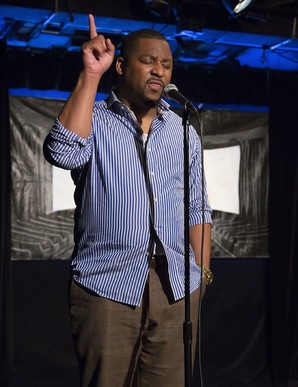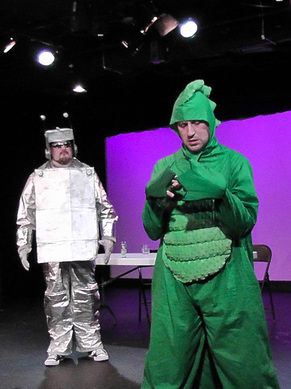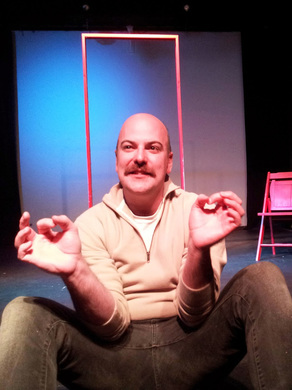The Audacity Theatre Lab Story
To see a list of past productions go... HERE.
Previously known as Audacity Productions (1999-2006), the company participated in many Dallas area fests such as the Festival of Independent Theatres and Out of the Loop, represented north Texas at the New York International Fringe Festival multiple times, and produced works for Austin's FronteraFest as well as the Mind Over Money Theatrical Festival. As Audacity Productions the company mounted over 50 plays - large and small - during nearly eight years of operation. The leaders of this little theatre absorbed a lot. They learned a great deal, by doing, from this earlier garage-band-sized Audacity. Audacity Productions filed articles of dissolution in the summer of 2006, when Artistic Director Brad McEntire headed off for more than a year abroad, living and working primarily in Hong Kong.
Previously known as Audacity Productions (1999-2006), the company participated in many Dallas area fests such as the Festival of Independent Theatres and Out of the Loop, represented north Texas at the New York International Fringe Festival multiple times, and produced works for Austin's FronteraFest as well as the Mind Over Money Theatrical Festival. As Audacity Productions the company mounted over 50 plays - large and small - during nearly eight years of operation. The leaders of this little theatre absorbed a lot. They learned a great deal, by doing, from this earlier garage-band-sized Audacity. Audacity Productions filed articles of dissolution in the summer of 2006, when Artistic Director Brad McEntire headed off for more than a year abroad, living and working primarily in Hong Kong.
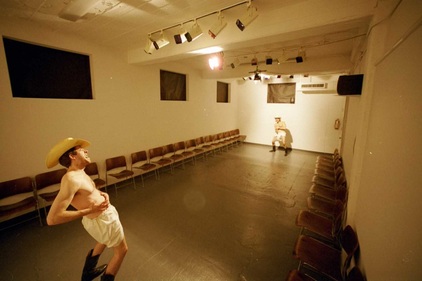 Steven Spehar's THE FRONTIER (produced by Audacity Productions, 2002)
Steven Spehar's THE FRONTIER (produced by Audacity Productions, 2002)
When McEntire returned to the north Texas area he assembled a small group of brave like-minded artists including Jeff Swearingen, Cassidy Crown, Ruth Engel and Jeff Hernandez. Some of this new group stuck around, some moved on to other projects completely outside the company. Some started companies of their own. The concept of a company members staying for varying lengths of time has remained as a hallmark of the organization.
It was decided to keep the name Audacity. The group came up with a new focus and a new mission and set to work once again. Since, in hindsight, the earlier project seemed like a sort of foundation for experimentation, a new name was adopted to reflect a sense of exploration, examination and discovery. This new name also served as way to link to this new endeavor to the work from 1999 to 2006. Audacity Productions thus became the pilot program for Audacity Theatre Lab.
Audacity Theatre Lab took up operations in Dallas in early 2008. Since then, ATL has developed quite a body of work, participated in theatre festivals around North America, garnered solid press, grown a loyal audience base and won several local awards. The 2009 production of HELLO HUMAN FEMALE was named Winner for Best New Play by the DFW Theatre Critic's Forum, Listed as a Top Ten of 2009 by the Dallas Voice, and garnered actors Jeff Swearingen and Becca Shivers Best Comic Actor/Actress winners for the Dallas Observer's Best of 2009! Arianna Movassagh and Jeff Swearingen snagged recognition for Best Actress/Best Actor at the 2010 Column Awards! Swearingen went on to win the amusingly-named 2010 Ultimate Best Actor Award from Pegasus News.com based on his work in HELLO HUMAN FEMALE.
In mid-2008 Audacity Artistic Director Brad McEntire instigated a large scale audio theatre project. He commissioned pieces from emerging playwrights from around the country (many were members of organizations like 13P, New Dramatists, Austin Script Works, etc.). McEntire teamed up with sound designer John Flores and Sound Engineer/Composer Chris Humphrey and began production on an epic-sized radio drama project called EYE IN THE SKY. The production of this project stretched from 2009 to 2012.
By mid-2010 ATL temporarily ceased operations and the artists involved began thinking about the working model they were using. Faced with the dilemma many groups face once they've passed the 10 year mark, the artists of Audacity had to decide how they wanted to progress. They could grow into a full-fledged institution complete with a large board, salaried staff, consistent facilitated venue and large operating budget and spend a considerably larger amount of time fund-raising, accounting, administrating and filling out grant proposals. This is, after all, how nonprofit theatres usually work. The goal is to get bigger and bigger.
This model didn't sit well with McEntire and the rest of the ATL artists.
This dilemma was intensified by the fact that since 1999 the group had never established a single "home" venue, had never solicited grant money of any kind - public or private - and had never developed "seasons." The group had never sold subscriptions, had never concerned themselves with trying to pander to audiences and had never really gone out of their way to anchor themselves in the local arts community. The artists of Audacity were simply too busy making theatre. Having continually created projects in an inventive, non-glitzy and in an increasingly theatrically sophisticated way, the group grew accustomed to operating on an excessively thin shoe-string budget.
It was decided to keep the name Audacity. The group came up with a new focus and a new mission and set to work once again. Since, in hindsight, the earlier project seemed like a sort of foundation for experimentation, a new name was adopted to reflect a sense of exploration, examination and discovery. This new name also served as way to link to this new endeavor to the work from 1999 to 2006. Audacity Productions thus became the pilot program for Audacity Theatre Lab.
Audacity Theatre Lab took up operations in Dallas in early 2008. Since then, ATL has developed quite a body of work, participated in theatre festivals around North America, garnered solid press, grown a loyal audience base and won several local awards. The 2009 production of HELLO HUMAN FEMALE was named Winner for Best New Play by the DFW Theatre Critic's Forum, Listed as a Top Ten of 2009 by the Dallas Voice, and garnered actors Jeff Swearingen and Becca Shivers Best Comic Actor/Actress winners for the Dallas Observer's Best of 2009! Arianna Movassagh and Jeff Swearingen snagged recognition for Best Actress/Best Actor at the 2010 Column Awards! Swearingen went on to win the amusingly-named 2010 Ultimate Best Actor Award from Pegasus News.com based on his work in HELLO HUMAN FEMALE.
In mid-2008 Audacity Artistic Director Brad McEntire instigated a large scale audio theatre project. He commissioned pieces from emerging playwrights from around the country (many were members of organizations like 13P, New Dramatists, Austin Script Works, etc.). McEntire teamed up with sound designer John Flores and Sound Engineer/Composer Chris Humphrey and began production on an epic-sized radio drama project called EYE IN THE SKY. The production of this project stretched from 2009 to 2012.
By mid-2010 ATL temporarily ceased operations and the artists involved began thinking about the working model they were using. Faced with the dilemma many groups face once they've passed the 10 year mark, the artists of Audacity had to decide how they wanted to progress. They could grow into a full-fledged institution complete with a large board, salaried staff, consistent facilitated venue and large operating budget and spend a considerably larger amount of time fund-raising, accounting, administrating and filling out grant proposals. This is, after all, how nonprofit theatres usually work. The goal is to get bigger and bigger.
This model didn't sit well with McEntire and the rest of the ATL artists.
This dilemma was intensified by the fact that since 1999 the group had never established a single "home" venue, had never solicited grant money of any kind - public or private - and had never developed "seasons." The group had never sold subscriptions, had never concerned themselves with trying to pander to audiences and had never really gone out of their way to anchor themselves in the local arts community. The artists of Audacity were simply too busy making theatre. Having continually created projects in an inventive, non-glitzy and in an increasingly theatrically sophisticated way, the group grew accustomed to operating on an excessively thin shoe-string budget.
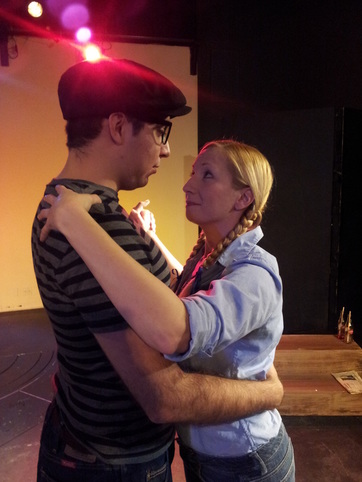 RASPBERRY FIZZ by Brad McEntire (Produced by Audacity Theatre Lab, 2014)
RASPBERRY FIZZ by Brad McEntire (Produced by Audacity Theatre Lab, 2014)
Maturation must equal expansion, right? The organizers of the company had no desire to grow in size, but they also didn't want to keep spinning their wheels for the sake of it. They could have kept making tiny, cheap productions for decades. But with what impact? If the small size of the organization was a non-starter, they really just had to clear up one really important issue: the exact purpose of the theatre.
They began to question a lot of assumptions. They focused both on the form (how they wanted to do theatre) and content (and what kind of theatre).
There were basic questions: What kind of work do we want to do? How do we approach doing this work? Who is the work for? How do we get the work out to this audience? How do we handle the practical concerns of casting, rehearsing, marketing, accounting and producing? What can Audacity offer that is different than other theatres? What defines a theatre company?
Beyond that, the artists had to ask themselves one over-riding thing: What do we, as individual theatre artists, want to say? What do we want to say and who is saying it? The answer to this simplest of all questions would dictate what the artists would need out of a company. This in turn would indicate how the theatre would serve the community.
ATL took cues indirectly from such influences as diverse as the philosophy of Individualism (as opposed to Collectivism common to traditional theatre ensembles), the administrative structure and mission of 13P, Neo-Futurist founder Greg Allen's 25 Rules, Walter Kerr's book How Not To Write a Play and the work hard/play hard irrelevance of The Debate Society. This was combined that with a touch of the comic book aesthetic of Vampire Cowboy Theatre and the outlook of small press indie publishing houses like the eccentric Tiny Hardcore Press. At last the group settled on an identity for their theatre. Defying normal conventions, they disregarded the usual conventions of non-profit theatres and put together a new kind of artistic collective.
There would be no season, no subscriptions, no exclusive home venue, no outreach. Heck, the concept of a collective would be striped down to its most fluid meaning. The company would be trimmed down to focus only on the most important issue: serving the artists, so the artists can make the art. The artists would be put at the heart of Audacity Theatre Lab. Each artist at ATL would be an instigator, developing and helming his or her own individual projects. The artist would see this personal project through from the first germinating ideas to the final finished production. The entirety of the practical resources of the company would be at the artists' disposal. The traditional lines between actor, director, writer, producer and designer would blur here. The usual hierarchies would be cast aside. Outside an emphasis on the intimate and immediate, there would be no "house style" or unifying company aesthetic. Instead, a handful of unique and individual voices would each make his or her own kind of theatre. Audacity would become an umbrella of sorts, a kind of joint-studio, a laboratory for idiosyncratic theatrical expression.
Now, over a decade later, the company has continued to evolve. We have re-invented ourselves several more times. We have gradually discovered a way of operating that truly emphasizes the individual artist. A diverse body of work has grown out of this Collective of Individuals approach.
To read more about how we currently operate visit... HERE.
They began to question a lot of assumptions. They focused both on the form (how they wanted to do theatre) and content (and what kind of theatre).
There were basic questions: What kind of work do we want to do? How do we approach doing this work? Who is the work for? How do we get the work out to this audience? How do we handle the practical concerns of casting, rehearsing, marketing, accounting and producing? What can Audacity offer that is different than other theatres? What defines a theatre company?
Beyond that, the artists had to ask themselves one over-riding thing: What do we, as individual theatre artists, want to say? What do we want to say and who is saying it? The answer to this simplest of all questions would dictate what the artists would need out of a company. This in turn would indicate how the theatre would serve the community.
ATL took cues indirectly from such influences as diverse as the philosophy of Individualism (as opposed to Collectivism common to traditional theatre ensembles), the administrative structure and mission of 13P, Neo-Futurist founder Greg Allen's 25 Rules, Walter Kerr's book How Not To Write a Play and the work hard/play hard irrelevance of The Debate Society. This was combined that with a touch of the comic book aesthetic of Vampire Cowboy Theatre and the outlook of small press indie publishing houses like the eccentric Tiny Hardcore Press. At last the group settled on an identity for their theatre. Defying normal conventions, they disregarded the usual conventions of non-profit theatres and put together a new kind of artistic collective.
There would be no season, no subscriptions, no exclusive home venue, no outreach. Heck, the concept of a collective would be striped down to its most fluid meaning. The company would be trimmed down to focus only on the most important issue: serving the artists, so the artists can make the art. The artists would be put at the heart of Audacity Theatre Lab. Each artist at ATL would be an instigator, developing and helming his or her own individual projects. The artist would see this personal project through from the first germinating ideas to the final finished production. The entirety of the practical resources of the company would be at the artists' disposal. The traditional lines between actor, director, writer, producer and designer would blur here. The usual hierarchies would be cast aside. Outside an emphasis on the intimate and immediate, there would be no "house style" or unifying company aesthetic. Instead, a handful of unique and individual voices would each make his or her own kind of theatre. Audacity would become an umbrella of sorts, a kind of joint-studio, a laboratory for idiosyncratic theatrical expression.
Now, over a decade later, the company has continued to evolve. We have re-invented ourselves several more times. We have gradually discovered a way of operating that truly emphasizes the individual artist. A diverse body of work has grown out of this Collective of Individuals approach.
To read more about how we currently operate visit... HERE.
